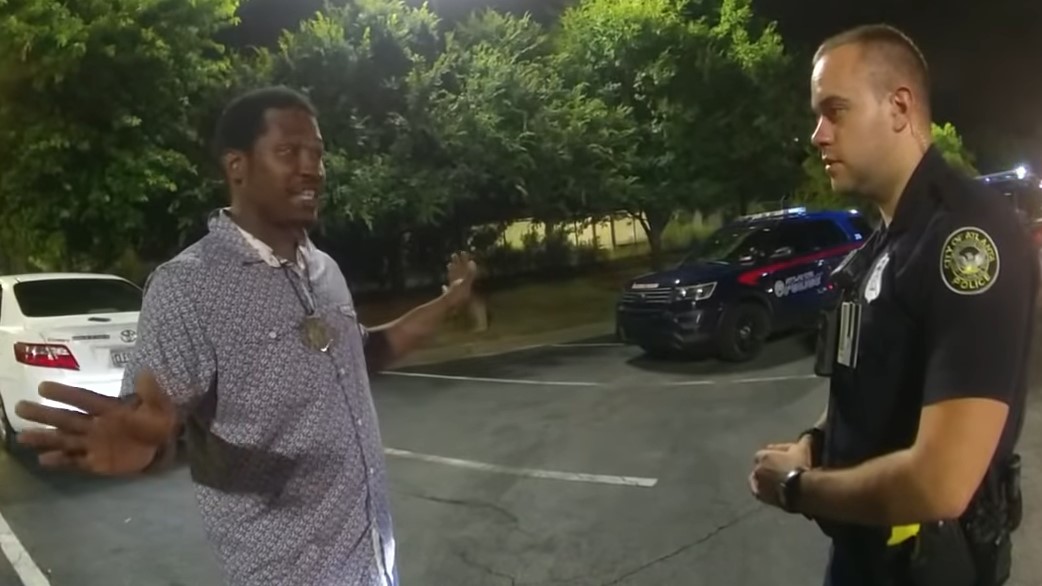Of Course Kyle Rittenhouse Was Acquitted
It is one thing to argue that the jury reached a reasonable verdict based on the law, and another entirely to celebrate Rittenhouse’s actions.
By
Adam Serwer
NOVEMBER 19, 2021, 7:33 PM ET
About the author:
Adam Serwer is a staff writer at
The Atlantic, where he covers politics.
The United States is a nation awash in firearms, and gun owners are a powerful and politically active constituency. In state after state, they have helped elect politicians who, in turn, have created a permissive legal regime for the carry and use of firearms, rules that go far beyond how courts originally understood the concept of self-defense.
These laws have made it difficult to convict any gun owner who knowingly puts themselves in circumstances where they are likely to use their weapon—that is, anyone who goes looking for a fight. It should come as no surprise then, that Kyle Rittenhouse was acquitted of all charges after shooting three men in Kenosha, Wisconsin, in 2020, killing two of them. Joseph Rosenbaum and Anthony Huber were killed; Gaige Grosskreutz was injured but survived to
testify against Rittenhouse at his trial.
According to Wisconsin law, Rittenhouse need not have proved that he acted in self-defense—rather, the
state had to prove that he did not. Even if Rittenhouse traveled to Kenosha with a firearm because he wanted to put himself in the position to use it,
as David French writes, “the narrow nature of the self-defense inquiry is one reason people can escape responsibility for killings that are deeply wrongful in every moral sense.” Under some circumstances, Wisconsin law allows an individual to
provoke an attack and
still claim self-defense.
It is one thing to argue that the jury reached a reasonable verdict based on this law, and another entirely to celebrate Rittenhouse’s actions. Much of the conservative media and the Republican Party, however, don’t see the killings as “wrongful” in any sense, instead elevating Rittenhouse as the manifestation of retributive violence against their political enemies.
The shootings took place across the backdrop of protests and riots in Kenosha that followed a police officer’s
2020 shooting of Jacob Blake, a 29-year old Black man, in the back and side, and the
nationwide protests over the
murder of George Floyd. Rittenhouse’s critics contend that his intentions were racist, because he showed up armed in anticipation of protests on behalf of Black rights, while his advocates maintain that he was defending the city from rioters and point out that his victims were white.
The ideological battle lines recall the 2013 George Zimmerman trial. In Zimmerman’s case,
prosecutors said he assaulted 17-year-old Trayvon Martin. Zimmerman’s defense claimed the then-29-year-old had been attacked by Martin, whom Zimmerman had been following. Even though Martin would have had reason to be concerned about a grown man following him, the law was designed to accommodate people like Zimmerman, who was armed, and his defense attorneys were able to create enough reasonable doubt among the jurors to secure his acquittal.
Conservatives saw Zimmerman as a martyr who acted in self-defense, unfairly vilified by a liberal press. Martin’s supporters saw him as yet another Black teenager perceived to be menacing both by authorities and by those who consider themselves adjacent to the authorities, as one of many Black children
never extended the benefit of the doubt to which others are accustomed. But Zimmerman wasn’t simply acquitted; some on the right embraced his actions as the fulfillment of a violent fantasy.
Few people ever use a firearm in self-defense—doing so is rare
even for police officers—so the extreme elements of right-wing gun culture have to conjure the specter of impending catastrophe in order to maintain their political salience. Sometimes this manifests in deranged
reveries of armed revolution, sometimes in overt
fantasies of murdering urban minorities, and sometimes in the make-believe of resisting a
supposedly tyrannical government. Right-wing gun culture is not unlike the wellness industry, in that it requires the cultivation of a sustained insecurity in its audience in order to facilitate the endless purchase of its products. You can never be too skinny, and you can never have too many guns to stop the impending communist takeover.
Not content to maintain that Zimmerman was innocent of murder, some of his supporters lived vicariously through his gunning down of a Black teenager. People bought Trayvon Martin
shooting targets. Right-wing pundits
marked his birthday with jokes, and spread falsehoods about his background in an attempt to
retroactively justify Zimmerman’s killing of him. Some people turned Zimmerman into a hero, because he killed the kind of person they liked to imagine themselves killing. The fact that then-President Barack Obama empathized with the fear of many Black parents, that their children will be seen not as children but as dangerous threats, by saying that if he had a son “
he’d look like Trayvon,” only added to the fantasy’s appeal.
The legal questions in the Rittenhouse trial—like those of the Zimmerman trial—have become entangled with the political ones. In the aftermath of the January 6 attempt to overthrow the results of the 2020 election, some conservative media have escalated their justifications of political violence. In this context, Rittenhouse has
become a folk hero for the same reason Zimmerman became one—not because they see him as a scared child who acted rationally in a frightening situation, but because they see him as a soldier in a war against the enemies of America as they want it to be. Like Zimmerman, Rittenhouse killed the kind of people some on the right like to fantasize about killing.
As the historian Caroline Light
writes in Stand Your Ground, English common-law
traditionally held that self-defense could be invoked only as long as one attempted to retreat, if possible. There were important exceptions such as defending one’s home, a concept known today as the “castle doctrine.” In the aftermath of Reconstruction, American courts began expanding the circumstances under which certain men could invoke the right of self-defense; an Ohio court determined in 1876 that “a true man, who is without fault, is not obliged to fly from an assailant, who by violence or surprise maliciously seeks to take his life, or to do him enormous bodily harm.” In the 21st century, state legislatures passed legislation such as “stand-your-ground laws” that extended the circumstances under which “self-defense” could be invoked further. But from the beginning, such laws were bound up in the perceived social morality of the invoker, and those whom the right was being invoked against. The “true man” could take his castle anywhere.
Consequently, which acts of violence are considered legitimate self-defense has always been highly political. For most of American history, white men alone had a right of self-defense that included both their persons and property. Although the concept of armed self-defense is not inherently racist in the abstract—many 1960s civil-rights figures bore arms when not protesting—in practice the American legal system has tended to see certain claims of
self-defense as more legitimate than others. “Our embrace of lethal self-defense has always been selective and partial,” Light argues, “upholding a selective right to kill for some, while posing others as legitimate targets.”
Zimmerman had a right to defend himself; his supporters could see Martin only as the sort of person the right of self-defense was meant to be invoked against. In Georgia, Travis McMichael, on trial for murder after he, his father, and a friend chased Ahmaud Arbery through their neighborhood, before pulling guns on him, has similarly sought to justify his actions
as self-defense. “It was obvious that he was attacking me, that if he would’ve got the shotgun from me, then it was a life or death situation,” McMichael testified. “And I’m gonna have to stop him from doing this, so I shot.” Even the white nationalists facing a civil lawsuit over their 2017 riot in Charlottesville, Virginia, have sought to
invoke their right to self-defense.
There is a paradox of fragility here, in which a moment of fear—perhaps one imbuing the deceased
with supernatural strength—is invoked to justify homicide, and the dead who would be alive but for this moment of terror subsequently become a symbol of the frightened man’s valor. At a certain point the logic of this sort of “self-defense” becomes indistinguishable from a custom that simply allows certain people to get away with murder. This is the legal regime that a powerful minority of gun-rights advocates have built—one in which Americans are encouraged to settle their differences with lethal force, preferably leaving as few witnesses capable of testimony as possible.
The fact that Rittenhouse has become a folk hero among Republicans points to darker currents within the GOP, where justifications for political violence against the opposition are becoming more common. The party finds the apocalyptic fear of impending leftist tyranny useful not only for turning out its supporters, but also for rationalizing legislative attempts to disenfranchise, gerrymander, and otherwise nullify the votes of Democratic constituencies.
Engineering the American political system so that Republicans’ political rivals are unable to contest their power is a less forceful solution than killing people,
but the political goal is similar: to never have to share power with those they disagree with.
For this reason, the party defends those who
engage in rhetoric threatening violence against their political enemies and
silences those who denounce it. Whether it’s Donald Trump justifying his attempts to
overturn the 2020 election, Republican members of Congress
threatening their colleagues, or Fox News hosts
praising Rittenhouse for “doing what the government should have done,” the desire to kill your political opponents is a sentiment no longer confined to the dark corners of the internet. The principle that canonizes Rittenhouse as a saint for defending his city from rioters, and the
mob that stormed the Capitol as martyrs, is the principle that the slaughter of the right’s enemies is no crime.
“At this point, we’re living under corporate and medical fascism. This is tyranny,” said an attendee at an event held by
the conservative group Turning Point USA in October. “When do we get to use the guns?” The audience responded with applause. “How many elections are they going to steal before
we kill these people?” Most of this is idle bluster from keyboard gangsters on social media. But the more it is encouraged by mainstream political leadership, the less likely it is to remain mere talk.
Rittenhouse’s trial was a matter of law, and the outcome should not have been dependent on the political questions raised by the events that led to his indictment. But his acquittal will be seen by some on the militant right as a validation of the sentiment that someday, perhaps soon, they will get to kill all “these people.” No one they would listen to will tell them otherwise.

 news.sky.com
news.sky.com












